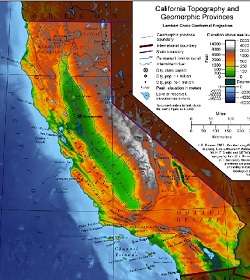Breaking Up California an Idea That Won't Go Away, For Good Reason
Californians would be better equipped to govern themselves fairly.

Years ago, I was riding an Amtrak train from Virginia to New Jersey and was chatting with a couple from California, who were stunned at how rapidly the train went from one state to another. One can drive from southern Maine to North Carolina and pass through a dozen states, plus the District of Columbia, in roughly the same distance as going from San Diego to Crescent City, California.
Consider also that California's approximately 39 million population equals the total combined population of the nation's 22 smallest states. I can regale you with geographic trivia, but the closer you look, the harder it is to fathom why talks of breaking up California are not taken more seriously. California is too large in size and population to be governed fairly.
Note the word "fairly." There's plenty of debate about whether California is governed properly. I think not, but I cover the state Capitol and listen closely to the zaniness. I own a historic home that would have been flushed down the Feather River like detritus circling a toilet bowl, had the Oroville emergency spillway collapsed. California's leaders lavish public employees with benefits and build silly bullet trains, yet can't maintain basic infrastructure. And then they strong-arm us into raising taxes, yet again.
But, ultimately, the "properly" question is a matter of political philosophy. Most liberal Democrats I know are happy with the way California is managed, and with the priorities that emanate from Sacramento. And why not? They control every state constitutional office and have supermajorities in the legislature. That's where fairness comes in. People who live outside the metropolitan areas are always overruled in the Capitol. They have no effective representation, no way to govern according to local values.
In late March, two leaders of the Brexit movement—the successful, underdog referendum to extricate the United Kingdom from the European Union—were in Huntington Beach to receive an award from the American Association of Political Consultants. While there, they touted the latest plan to chop up California into two or more independent states. This is Version 2.0 of Silicon Valley entrepreneur Tim Draper's previous plan to create "Six Californias."
I've read dismissive and even mocking media coverage of Draper's idea. It's ridiculous, some say, even though there have been dozens of efforts to break up California since the beginning of the state. The eastern borders were largely arbitrary—and designed basically by committee at a constitutional convention.
But the imprimatur of two Brexit ringleaders, party leader Nigel Farage and financier Arron Banks, has put the issue back in the news, given that their British effort was once deemed too silly to contemplate. They beat the odds, so why can't we? While in Orange County, they met with former Orange County Republican Party Chairman Scott Baugh, who has said the breakup idea would improve democratic representation. He's right. They were well-received when they spoke to local groups about Brexit and the possibility of partitioning California.
There have been myriad ideas to address our representation problem. I've written occasionally about San Diego-area businessman John Cox and his efforts to qualify a statewide initiative that would vastly expand the size of the Legislature. It sounds unwieldy to elect 8,000 Assembly members, which is why his Citizen Legislature plan still needs revamping. But the general idea makes sense.
In California, we have one Assembly member for every 483,000 residents. That's the worst ratio in the country. In New Hampshire, which has the best ratio, there are approximately 3,200 residents for every member of the statehouse. What are your chances of influencing or even reaching your legislator—or even his or her staffers—in California?
In a state as big as ours, only the big guys—the political parties, labor unions and other special interests—matter. Breaking up one mega-state into multiple reasonably sized states, where people with like-minded interests can better govern themselves, is a great idea that gives voters more power. If that won't happen, then we at least need more representative districts.
I carefully analyzed the Six Californias proposal, and found it would have created a competitive situation in the three more conservative states. The liberal states around Los Angeles, San Jose and Sacramento would have remained liberal bastions, but at least officials would be closer to home and more accountable.
I dismiss the "Calexit" idea, however, because it would make California its own nation. I can't imagine living without the protections of the U.S. Constitution (or what's left of it). It won't happen. Plus, it's reportedly advocated by a man with Russian ties.
But there's no reason we can't give new boundaries to old states. If Rhode Island—not much larger than Orange County—can have two senators and a Capitol, why can't there be several states formerly known as California? Thanks to Farage, Banks, Draper and Baugh for helping us revisit a vital question.


Show Comments (223)